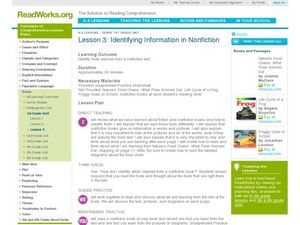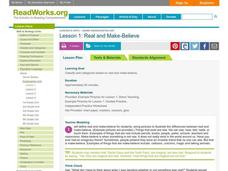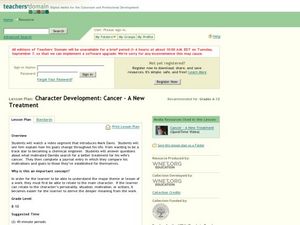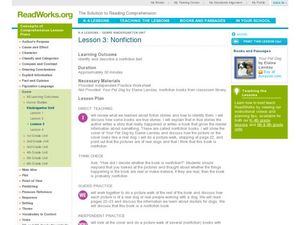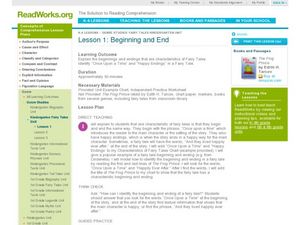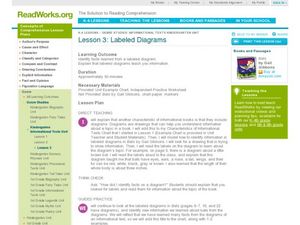Curated OER
Identifying Information in Nonfiction
Second graders investigate information in non-fiction texts. They review the features of a non-fiction text and read the book Nature's Food Chains: What Polar Animals Eat. Pupils discuss the text features and write down one fact they...
Curated OER
Lesson 3: Labeled Diagrams
Examine the book Stargazers by Gail Gibbons. Young readers will practice reading and interpreting information from diagrams in this informational text. They work together as a class on this skill and then move into independent practice....
Curated OER
Characteristics of Nonfiction
The second lesson in a series from ReadWorks.org, this lesson continues to explore the difference between fiction and nonfiction texts. The lesson opens with the teacher reviewing a class Venn diagram started in the last lesson....
PBS
Exploring Selected Haiku by Issa
If your class doesn't know what a haiku is, show them two examples from the Japanese poet Issa (both included here), and have them make some observations. How long are they? What is the structure? A video and a list of questions help...
Curated OER
Exploring Contrasts in "The Lanyard," by Billy Collins
A good gift is hard to find. A “worn truth,” perhaps, as Billy Collins says in his poem, “The Lanyard,” but true nonetheless. After a study of Collins’ tribute to a mother’s love, young poets select an object that sends them “into the...
Curated OER
American Literature Authors and Their Works
Learners match American Literature authors with their short stories, poems, and books. In this American Literature lesson, students are given an overview of the authors and their main works. Then learners independently do a matching...
Curated OER
Crucible Test
In this literature analysis worksheet, students write a paragraph using quotes and specific examples as an essay test of The Crucible.
Curated OER
Real and Make Believe
Young readers sort pictures into real and make believe categories. In this real and make believe lesson plan, students have a discussion about things that are real and things that are make believe.
Curated OER
New Information
Young readers explore informational texts as they read a text entitled Giant Pandas by Gail Gibbons. The teacher will begin by explaining that one characteristic of informational texts is that they teach the reader new information and...
Curated OER
Magical and Mystical Details
Identify magical and mystical details in the tales The Legend of Bluebonnet and The Legend of Old Befana. Talk about seemingly impossible details and illustrations in order to demonstrate the qualities of legend and magic. Encourage...
Curated OER
Fiction vs. Nonfiction
Young scholars explore fiction and nonfiction writing. They identify the elements of fiction in a short story and identify the criteria necessary in a nonfiction piece. Students distinguish the author's purpose in an expository text,...
Curated OER
Myths, Folktales, & Fairy Tales
Introduce the concept of myths to your class. Using the link to "Myths Around the World," read a story aloud and have learners list characteristics of a myth. Readers then choose their own myths from the site and work in groups to answer...
Center for Open Educational Resources and Language Learning
Reading Activity
Ready to integrate technology into your ELL instruction? Check out this reading lesson that has language learners using the Internet and apps, joining online book clubs, and creating blogs. A fine model of what can be done.
Curated OER
Character Development: Cancer - A New Treatment
Students explore the concept of character development. In this character development lesson, students watch a video segment regarding a family's struggle with cancer. Students examine the personality, situation, motivation, and actions...
Curated OER
Lesson 2: Fiction
What makes a book fiction or nonfiction? Kindergartners discover ways to find out if a book is real or made up. They examine a fictional picture book as a group and decide what clues help them decide. There is an independent worksheet...
Curated OER
Lesson 3: Nonfiction
Introduce young readers to the word of non-fiction. They examine the features found in non-fiction books such as, facts, dates, and realistic pictures. They discuss how the images in the book Your Pet Dog depict real dogs doing real...
Curated OER
Distinguishing Fiction and Non Fiction
Have your class go on picture walks of different books, and identify them as either fiction or non fiction and why. Working in groups, kindergartners state whether the book tells information or comes from the author's imagination. Use...
Curated OER
Lesson 1: Real People
A biography is a factual book or narrative about a real person. The book, The Story of Ruby Bridges is used to introduce non-fiction texts about real people and event to a Kindergarten class. A chart is used to highlight text features...
Curated OER
Lesson 2: Important Person
What kid wouldn't love to learn about George Washington? The class reads a simplistic biography about George Washington to find out why he is so famous. They chart the things he did, as well as what makes a non-fiction book a biography....
Curated OER
Lesson 1: Beginning and End
Students study fairy tales. For this fairy tales lesson, students discover beginning and ending phrases characteristic of these types of stories. They listen to their teacher read The Frog Prince, take notice of those familiar phrases,...
Curated OER
Labeled Diagrams
Let's learn about bats! Those flying creatures of the night inspire a lesson about non-fiction books. They start by charting characteristics commonly found in informational texts, specifically charts, diagrams, and labels. They look at...
Curated OER
Lesson 3: Tells a Story
Kindergartners listen to a nursery rhyme and then tell the story in their own words (without rhyming). They practice as a class using Jack and Jill and then try Three Blind Mice on their own. The lesson includes a worksheet for the...
Curated OER
Step By Step Directions
Perfect for your unit on pumpkins and autumn! Learn how to write step by step directions on how to dry pumpkin seeds based on The Pumpkin Book. Youngesters also explain how they know this is a "how to" book. A fun and yummy lesson!
Curated OER
Heroes
Students read the story of Paul Bunyan and identify the characteristics and actions that make him a hero. In this heroes lesson plan, students explain their answer and draw pictures.
Other popular searches
- Mystery Genre
- Fantasy Genre
- Literary Genres
- Genre Characteristics
- Comparing Literary Genres
- Teaching Genre
- Literature Genres
- Reading Genres
- Genre Study
- Crime Fiction Genre
- Folk Tale Genre
- Mystery Genre 5th Grade


